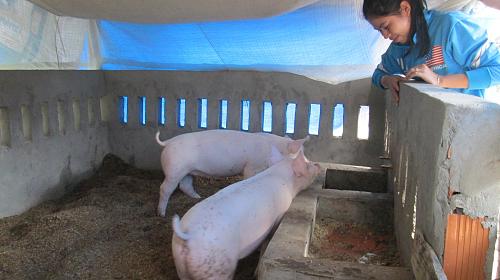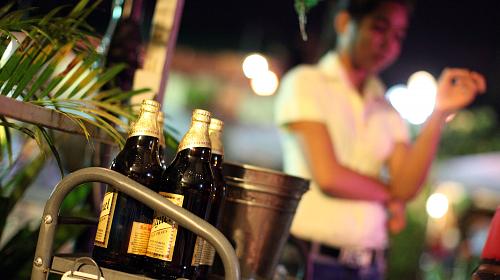
It seems like a simple change, but it has a big impact. Put pigs in a smaller pen with different material to sleep on, and you can reduce emissions, increase a family’s income by 50%, and empower women. Don’t believe us? Check out Son Thi So Da’s story in Vietnam.
Ms. Son Thi So Da is a Khmer woman, living in Soc Trang province with her husband, and their three-year-old son. She took $325 in startup capital and turned it into a profit of $375, a new house, growing her businesses, and independence. She was able to use a new climate-resilient method of raising pigs—something she and her community identified during Community Based Adaptation work to earn an additional $375 per year—a little more than half what the World Bank projects minority women in Vietnam make annually.
What's the biggest change in So Da's life?
I am very happy because I have my own house now. Though it is small and simple, my mother does not have to support us anymore, and she doesn’t have to worry about us so much!
Four years ago, So Da was planting onions and chili on land she inherited land her parents, but it wasn’t a very stable income. Increases in hot weather and unpredictable heavy rain in recent years has decreased the reliability and yield of her crops. It was becoming difficult for the young family to survive; she sometimes had to seek help in providing for her son from her mother.
So Da heard about the climate-resilient livelihood packages being supported by CARE’s Integrated Community Based Adaptation in the Mekong (ICAM) project, through the Vietnam Women’s Union, and decided to participate in order to diversify her income sources. She received 5 million Vietnamese Dong (approx. US$250), and added her own 1.5 million dong (approx. US$75) to begin raising pigs using a climate-resilient bio-bedding method.
The bio-bedding is composed of rice husk or saw dust mixed with a special enzyme, locally available, that makes raising pigs easier and healthier.
After two rounds of pig raising, So Da and her husband made 4.5 million Dong profit (approx US$225). The profits also enabled them to invest in their onion business, boosting the profits from this to 3 million Dong (approx. US$150).
I hope to use the profits to enlarge the pigpen to be able to accommodate 4-6 pigs on the bio-bedding.
In the coming season, So Da plans to invest in growing more chili and farming shrimp, as well as expanding her pig-raising business.
The assistance package from the Vietnam Women’s Union and CARE in Vietnam enabled So Da and her husband to diversify their sources of income so that they can become more resilient to the increasingly changeable conditions in the Mekong Delta. As a result, they have been able to build their own house, and they are looking forward to a brighter and more secure future.
About the Project: Ms. Son Thi So Da [insert link here] was a part of CARE Vietnam’s Integrated Community Based Adaptation in the Mekong (ICAM), which ran from 2012 to 2015 with support from AusAid. It reached more than 50,000 people in Vietnam. 61% of beneficiaries say that project support has enabled them to earn more money. What do they do with the extra cash? 32% invest in climate-resilient agriculture practices, 32% in other kinds of agriculture, and 10% use it to build stronger houses to withstand climate shocks. The evaluation does note that livelihood interventions would be more scalable and effective if the project allowed more time for them to take effect.


